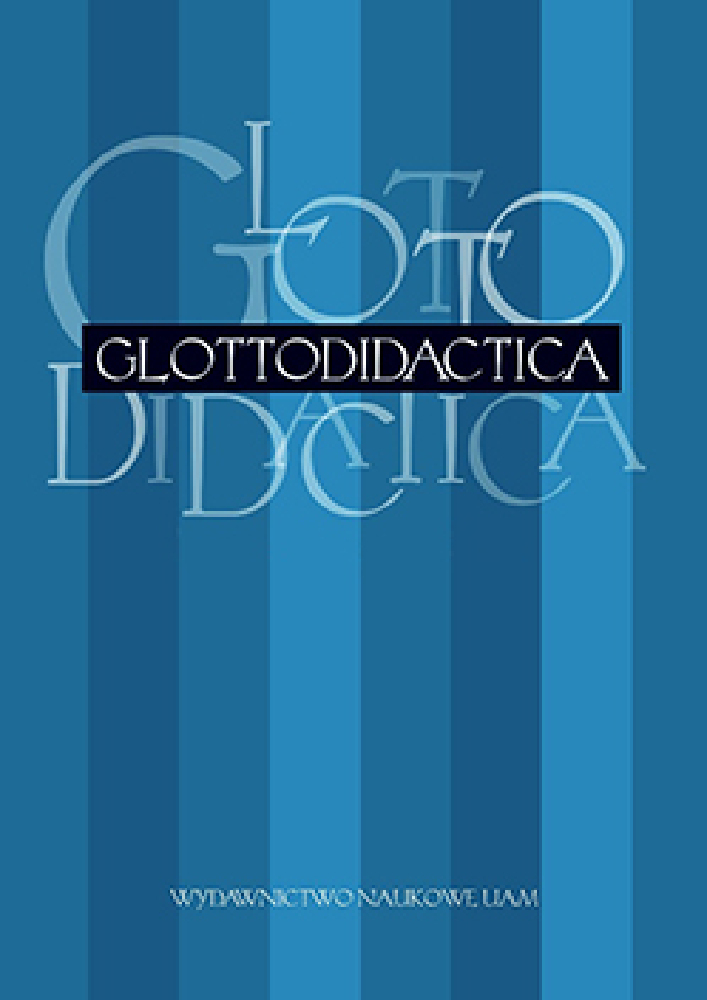Abstract
One of the main goals of the reform of the educational system in Poland in 2004 was
to ensure the equality of chances for all as well as social integration. This concept assumed an
equal access to the education also for students with special educational needs. The present paper
attempts to highlight the problems with implementing the inclusion concept in the language
classroom. The study presented in the article aims to investigate whether educational institutions
in Poland are ready to implement the concept of inclusion, as well as the competence of foreign
language teachers to cope with the diversity in the language classroom.
References
Bambara, L.M., Knoster, T.P. 2009. Designing Positive Behaviour Support Plans. Washington: American Association on Intellectual and Developmental Disabilities.
Dumont, H., Istance, D. 2013. Analiza i tworzenie środowisk uczenia się XXI wieku. In: Dumont, H., Istance, D., Benavides, F. (Hrsg.). Wykorzystanie wyników badań w praktyce. Warszawa:Wolters Kluwer Polska SA, 35–59. DOI: https://doi.org/10.1787/9789264201606-pl
Dziennik Ustaw 2004 nr 256 poz. 2572. Ustawa z dnia 7 września 1991 r. o systemie oświaty ze zmianami z dnia 19 listopada 2004 r.; file:///C:/Users/moni/Downloads/D20042572.pdf (abgerufen am 30.12.2015).
Europäische Agentur für Entwicklungen in der sonderpädagogischen Förderung, 2012. Ein Profil für inklusive Lehrerinnen und Lehrer. Odense, Dänemark: Europäische Agentur für Entwicklungen in der sonderpädagogischen Förderung. http://www.european-agency.org/sites/default/files/te4i-profile-of-inclusiveteachers_Profile-of-Inclusive-Teachers-DE.pdf (abgerufen am 30.12.2015).
Europäische Agentur für sonderpädagogische Förderung und inklusive Bildung, 2014. Fünf Kernaussagen in Bezug auf inklusive Bildung. Von der Theorie zur Praxis. Odense, Dänemark: Europäische Agentur für sonderpädagogische Förderung und inklusive Bildung.https://www.europeanagency.org/sites/default/files/Five_Key_Messages_for_Inclusive_Education_DE.pdf (abgerufen am 30.12.2015)
Gajdzica, Z. 2011. Opinie nauczycieli szkół ogólnodostępnych na temat edukacji włączającej uczniów z lekkim upośledzeniem umysłowym w kontekście toczącej się reformy kształcenia specjalnego. In: Gajdzica, Z. (Hrsg.). Uczeń z niepełnosprawnością w szkole ogólnodostępnej. Sosnowiec: Oficyna Wydawnicza Humanitas. Wyższa Szkoła Humanitas, 56–81.
Głodkowska, J. 2010. Model kształcenia uczniów ze specjalnymi potrzebami edukacyjnymi – różnice nie mogą dzielić. In: Podniesienie efektywności kształcenia uczniów ze specjalnymi potrzebami edukacyjnymi. Materiały szkoleniowe. Warszawa: MEN. 37–92. Online: tz.skn.tu.koszalin.pl/14.pdf (abgerufen am 17.08.2014).
Główny Urząd Statystyczny. Oświata i Wychowanie w roku szkolnym 2014/15. file:///C:Users/moni/Downloads/oswiata_i_wychowanie_w_roku_szkolnym_2014-2015.pdf (abgerufen am 30.12.2015).
Hansen, J.H. 2012. Limits to Inclusion. In: International Journal of Inclusive Education. 16 (1),89–98. DOI: https://doi.org/10.1080/13603111003671632
Hattie, J. 2015. Widoczne uczenie się dla nauczycieli. Jak maksymalizować siłę oddziaływania na uczenie się. Warszawa: Centrum Edukacji Obywatelskiej.
Hurrelmann, K. 2002. Einführung in die Sozialisationstheorie. Weinheim und Basel: Beltz Verlag.
Karpińska-Szaj, K. 2011. Uczniowie z niepełnosprawnością w szkołach ogólnodostępnych:nauczanie języków obcych. In: Neofilolog 36, 59–72. DOI: https://doi.org/10.14746/n.2011.36.6
Karpińska-Szaj, K. 2013. Nauczanie języków obcych uczniów z niepełnosprawnością w szkołach ogólnodostępnych.Poznań: Wydawnictwo Naukowe UAM.
Pachowicz, M. 2011. Kształcenie integracyjne – moda czy krok milowy edukacji w Polsce. In: Gajdzica, Z. (Hrsg.). Uczeń z niepełnosprawnością w szkole ogólnodostępnej. Sosnowiec: Oficyna Wydawnicza Humanitas. Wyższa Szkoła Humanitas, 124–131.
Pfeiffer, W. 2001. Nauka języków obcych. Od praktyki do praktyki. Poznań: Wagros.
Reich, K. 2014. Inklusive Didaktik. Bausteine für eine inklusive Schule. Weinheim und Basel: Beltz Verlag.
Szeligiewicz-Urban, D. 2011. Wspomaganie rozwoju dzieci niepełnosprawnych a pomoc nauczyciela wspomagającego w szkole ogólnodostępnej. In: Gajdzica, Z. (Hrsg.). Uczeń z niepełnosprawnością w szkole ogólnodostępnej. Sosnowiec: Oficyna Wydawnicza Humanitas. Wyższa Szkoła Humanitas, 45–55.
Szumski, G. 2011. Teoretyczne implikacje koncepcji edukacji włączającej. In: Gajdzica, Z. (Hrsg.). Uczeń z niepełnosprawnością w szkole ogólnodostępnej. Sosnowiec: Oficyna Wydawnicza Humanitas. Wyższa Szkoła Humanitas, 13–23.
Warnock, M. 1978. Special Educational Needs. Report of the Committee of Enquiry into the Education of Handicapped Children and Young People. London: Her Majesty’s Stationery Office. http://www.educationengland.org.uk/documents/warnock/warnock1978.html (abgerufen am 5.03.2017).
Wyczesany, J. 2001. Edukacyjna refleksja nad teorią i praktyką pedagogiki specjalnej. In: Palak, Z. (Hrsg.). Pedagogika specjalna w reformowanym ustroju edukacyjnym. Lublin: Wydawnictwo Uniwersytetu Marii Curie-Skłodowskiej, 79–84.
Zawadzka-Bartnik, E. 2010. Nauczyciel języków obcych i jego niepełnosprawni uczniowie (z zaburzeniami i dysfunkcjami). Kraków: Impuls. https://www.schulministerium.nrw.de/docs/Schulsystem/Inklusion/ (abgerufen am 27.12.2015).
License
Copyright (c) 2017 Monika Janicka

This work is licensed under a Creative Commons Attribution-NoDerivatives 4.0 International License.
Authors
Authors of texts accepted for publication in Glottodidactica are required to complete, sign and return to the Editorial team’s office the Agreement for granting a royalty-free license to works with a commitment to grant a CC sub-license.
Under the agreement, the authors of the texts published in Glottodidactica grant Adam Mickiewicz University in Poznań a non-exclusive, royalty-free license and authorize the use of Attribution-NoDerivatives 4.0 International (CC BY-ND 4.0) Creative Commons sub-license.
The authors retain the right to the free disposal of the work.
Users
Interested Internet users are entitled to use works that have been published in Glottodidactica since 2016, under the following conditions:
▪ attribution – obligation to provide, together with the distributed work, information about the authorship, title, source (link to the original work, DOI) and the license itself.
▪ no derivatives – the work must be preserved in its original form. Without the author's consent, it is not possible to distribute the modified work in the form of translations, publications, etc.
Copyrights are reserved for all texts published before 2016.
Miscellaneous
Adam Mickiewicz University in Poznań retains the property right as a whole (layout, graphic form, title, cover design, logo etc.).
Privacy statement
The names and email addresses published on this journal site will be used exclusively for the purposes declared by this journal and cannot be used for any other purpose or by any other party.




